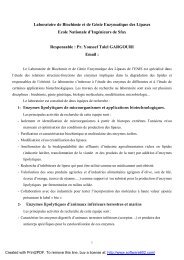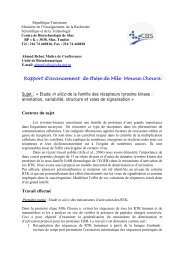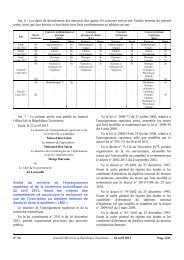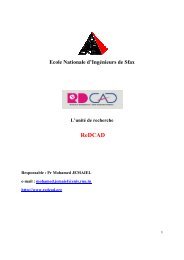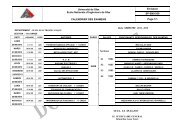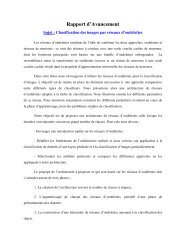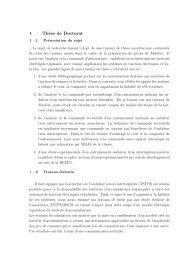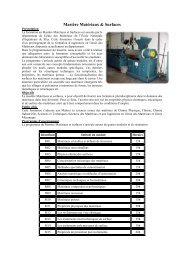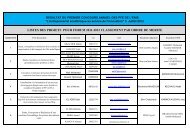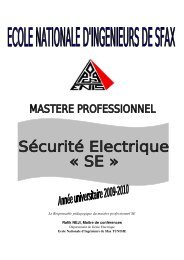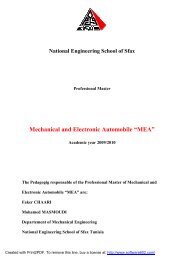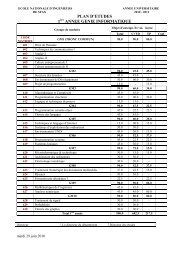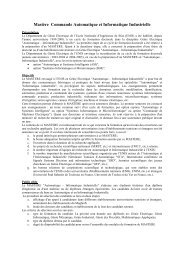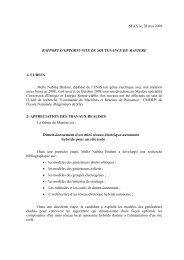Download Presentation (PDF Form)
Download Presentation (PDF Form)
Download Presentation (PDF Form)
You also want an ePaper? Increase the reach of your titles
YUMPU automatically turns print PDFs into web optimized ePapers that Google loves.
National School of Engineers of SFAX<br />
Professional Master<br />
Automatic Control and Industrial Computing<br />
Academic Year 2009-2010<br />
Responsible: Mohamed CHTOUROU<br />
Department of Electric- Engineering<br />
mohamed.chtourou@enis.rnu.tn Tel: + 216 74 274 088 (post: 248)<br />
National School of Engineers of SFAX, TUNISIA
<strong>Presentation</strong>:<br />
Since the university year 1999-2000, the department of electric- engineering of the<br />
National School of Engineering of Sfax (ENIS) has been empowered with a doctoral training<br />
cycle in the discipline of electric engineering “Automatic Computer-Industry”. The first stage<br />
of this doctoral training cycle in the discipline of electric engineering “automatic computer<br />
Industry”. The first stage of this doctoral training cycle has been on the preparation of a<br />
master. When the second phase, it involved the preparation of a doctoral thesis or a university<br />
enabling in electric engineering “Automatic computer industry”. The department of electric<br />
engineering of l’ENIS envisages the continuation of this doctoral training cycle (university<br />
year: 2003-2004 and 2004-2005) with a view to prepare a master in “Automatic Computer<br />
Industry” with the following three options:<br />
“Automatic and Intelligent Systems (ASI)”option.<br />
“Computer Systems and Mechatronics (SIM)” option.<br />
Objectives:<br />
The envisaged master in L’ENIS in electric engineering “Automatic Computer<br />
Industry” aims at giving highly theoretical and practical knowledge in the specialities<br />
“Automatic” and “Computer Industry” by prioritizing the methodological aspects. Lessons<br />
enable the undertaking of training through research in related areas: Modelling, identification,<br />
estimation, prediction and control systems, fuzzy systems, neutral networks, computer<br />
systems, advanced control, industrial production, information processing, microelectronics,<br />
irrigation systems, agricultural greenhouse, irrigation canals, electric machines and networks,<br />
etc.<br />
This training gives the master after three semesters of study. The first semester is<br />
consecrated to lessons: A core syllabus followed by a training cycle per option “Automatic<br />
and Intelligent Systems” option or “Computer Systems and Mechatronics” option or<br />
“Computer Systems and Mechatronics” option or “Control of Electric Machines” option. The<br />
second and the third semesters are reserved for preparing a research dissertation dealing with<br />
an original subject and of topicality and giving rise to a public defence before a jury.<br />
The content of this master is interesting both in training and opening on applied<br />
research. The opinions of several academics from Tunisian and foreign institutions were<br />
unanimous on this point. So, it is interesting to consolidate our strengths namely:<br />
a- The great interest that many academics give to this master.
Audience:<br />
b- The good fit, training and employment offered by the training provided by this<br />
master.<br />
c- The openness in the field of applied research.<br />
d- The selected national scientific research projects (SERST, etc) and the<br />
international ones (CMC4, etc).<br />
e- The important number of research teams in automatic computer systems at<br />
L’ENIS.<br />
f- The important number of scientific events organized by L’ENIS about the<br />
Automatic and Computer industry (Tunisian seminars on automatic “STA”,<br />
international conference on signals systems decision and information technology<br />
“S5D”, science days of young researchers in electric and computer systems<br />
engineering “GEI”, etc.<br />
g- The good relation between the scientific and technological cooperations<br />
established between academics from L’ENIS and those from Tunisian institutions<br />
(ENIG, ENIM, etc) or foreign academics (university Paul Sabatier of Toulouse,<br />
France, University of Toulon and VAR, France…<br />
The “Automatic Computer-Industry” master is aimed at students holding a diploma of<br />
engineer or a four year university degree or equivalent foreign diplomas candidates should<br />
have a good knowledge base in automatic and computer industry.<br />
The selection procedure of candidates is done in two steps:<br />
a- Display a call for applications in various Tunisian and foreign academic<br />
institutions including the institutions of the Maghreb<br />
b- Study candidates’ files and compiling of the list of the selected candidates.<br />
The criteria for selection are the following:<br />
a- Type of candidate training. Priority will be given to the graduates in electric<br />
engineering, computer systems engineering, mechanical engineering, industrial<br />
engineering, process engineering, and applied mathematics.<br />
b- Type of diploma obtained by the candidate.<br />
c- Degree of availability of the candidate to attend all training modules of the master.<br />
Opportunities and prospects:<br />
The master “Automatic Computer industry” sanctions the first stage of doctoral<br />
training (training by research during three semesters) and allows entry to doctoral thesis of
Tunisian and foreign higher education institutions, and more particularly to the thesis Ph.D in<br />
electric engineering “automatic computer industry” at L’ENIS. Those who have followed this<br />
doctoral training cycle interest national sectors with high growth potential such as: Automatic<br />
control, conduct computerized processes (chemical, biological, thermal, electric, mechanic,<br />
etc), control of electrical machines, and optimum management of the climate of greenhouses.<br />
In this respect, the scientific level as well as the acquired experience in research of the<br />
graduates in “Automatic computer Industry” master enables to consider job types for engineer<br />
in research and development in diverse industrial sectors.<br />
Teaching Program:<br />
Core syllabus (120h)<br />
“Automatic and Intelligent systems” option (120h)<br />
“Computer systems and mechatronics” option (120h)<br />
Education Plan:<br />
The proposed training program of electric engineering master “Automatic Computer<br />
industry” is composed of a core syllabus (120h) and two options (120h each) with theoretical,<br />
metho ’ological and applied aspects. In this training of master, the adopted pedagogy is:<br />
lectures, tutorials, work practices and site visits. These lessons which take place over a whole<br />
semester are penalized by written and oral exams.<br />
Hours<br />
Module<br />
Core Syllabus: Part1: Systems Analysis and Architecture (120h)<br />
20 Identification systems<br />
20 Nonlinear and non-stationary systems<br />
20 Neural Networks and Learning<br />
20 Fuzzy systems and Decision support<br />
20 Optimization and Genetic Algorithms<br />
20 Technical Machinery control<br />
“Automatic and Intelligent Systems” option<br />
Part2: “Automatic Complex Systems” (60h)<br />
20 Stochastic Systems<br />
20 Delayed Systems and Multivariable Systems<br />
20 Stability systems<br />
Part3: “ Advanced control” (60h)<br />
20 Optimal and Robust control
20 Predictive and adaptive control<br />
20 Intelligent Control<br />
“Computer Systems and Mechatronics” option<br />
Part2: “Computer Systems” (60h)<br />
20 Intelligent Automatic Classification<br />
20 Real time and Multitasking Kernel<br />
20 Man-machine systems and supervision<br />
Part3: “Mechatronic Systems” (60h)<br />
20 Industrial vision and Robotics<br />
20 Design of Embedded Systems<br />
20 Mecatronic Systems




